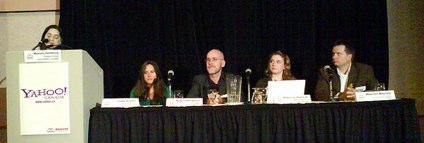- Home
- Blogs
- Rob Cottingham's blog
- 13 keys to a good panel
13 keys to a good panel
- 2 April, 2008
- 3 comments
I've been very lucky with panel discussions: I've never been on a dud. I hear the horror stories (and I've witnessed them from the audience): moderators who can't read the room, panelists who run way long and pitch their company relentlessly, and chemistry that just doesn't work.
Yesterday's panel on new media at Massive was another one that worked really, really well. We four panelists come from different backgrounds, play different roles in the process of developing new media, and so we weren't just echoing each other (although I'll admit there wasn't what you'd call raging disagreement on anything).
It helped a great deal that my co-panelists had enormous brains. But another key factor was our moderator, Monica Hamburg, who had a solid sense of when to probe deeper, when to move on and when to slacken the reins and let the audience start driving things for a while.
So what makes for a good panel? Well, it's partly alchemy, so don't go looking for foolproof recipes. But here are a few things that seem to happen at the panels that really work well:
- Panelists differ enough to keep the conversation lively, but have enough common ground for there to be a conversation in the first place.
- Everyone understands they're not there to pitch, but to give value to the audience.
- Introductory remarks are brief. That's both to leave enough time for questions, and to set the tone for interaction and audience engagement.
- Slides are banned. If the video projector's on at all, it's to show live examples as they come up in conversation (for example, someone mentions a particular web site).
- The moderator has both a collection of provocative questions in her pocket, and the understanding that she has no obligation to run through them.
- The first interaction with the audience happens early on. If nobody's asking questions, a friendly audience member is primed to break the ice - often called out explicitly by the moderator.
- The panel description in the conference material is clear and accurate. Nothing can sour a panel quite like an audience feeling they've been given a bait-and-switch.
- The room is comfortable, erring on cool.
- The moderator keeps track of time, and lets everyone know when things are nearing the end.
- Nobody gets more than their share of air time - and that goes for audience members, panelists and the moderator.
- The panelists have had a chance to talk with each other and the moderator beforehand about how things will unfold. A lot of "Um, is this the part where I talk?" and "Oh, er, I thought we were going to Penny before me" can get pretty tedious.
- The conference organizers choose panelists who can tell stories clearly and well - and briefly.
- You end on time, and leave them wanting more.
One last thing: Jeremiah Owyang has a terrific post with advice for moderators; it's worth reading (and re-reading) for anyone who's about to organize or sit on a panel.
Thanks again to Massive and Christie Mann, to Monica, and to my co-panelists Rebecca, Linda and Warren. (And to GusF for the photo from Flickr!)
Work Smarter with Evernote

Get more out of Evernote with Alexandra Samuel's great new ebook, the first in the Harvard Business Press Work Smarter with Social Media series!




Comments
Monica Hamburg says
I am very pleased with how it went. It was a really good panel and I learnt a great deal from all of you. Thanks for the compliments here and on my blog.
You noted: "Everyone understands they're not there to pitch, but to give value to the audience." I think that is so critical. Sitting in an audience thinking "I don't think I'm learning anything about this topic, aside from that X thinks his company is awesome" is very frustrating.
I too read Jeremiah Owyang's excellent post (pre-moderation) & it was very helpful. I also liked http://blog.guykawasaki.com/2006/03/how_to_be_a_gre.html which emphasized that the moderator is "not the star of the show". It makes me cringe everytime I see panels where the moderator isn't clear on that concept.
I have to add to your tips the following: Podiums should be able to lower automatically when the panelist is around 5 feet. But I might be a slightly biased...
Rob Cottingham says
Thanks for the kind words!
You know, I actually really dislike podiums: they physically and visually separate speaker from audience. Give me the five-chairs-on-a-stage layout any day, even if it does mean you need an audio tech wiring people up with wireless mikes for five minutes beforehand.
Erin Flis says
Thank you so much for this post - great information and very helpful. I've attended many, many panels, but prepping one (for AMA 2011) is an entirely different experience. #4 - 6 addressed specific questions I had. The others addressed questions I didn't know I had! Thanks for taking the time to share your thoughts.